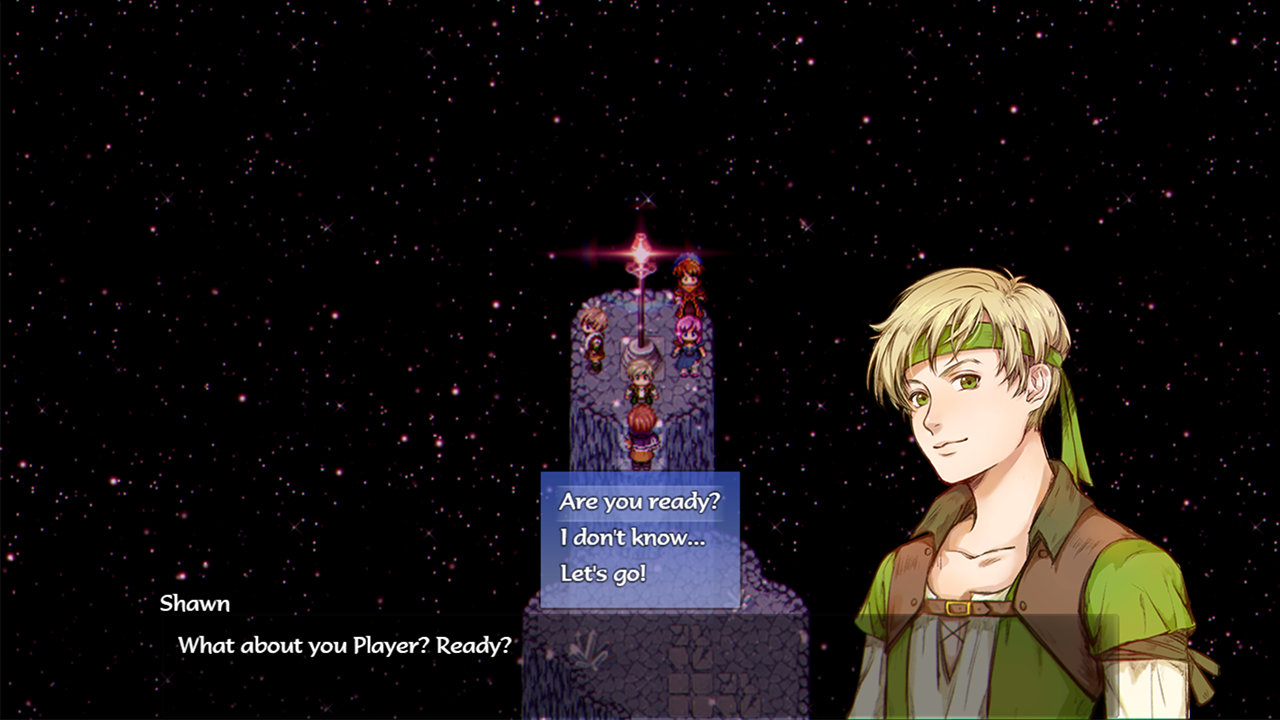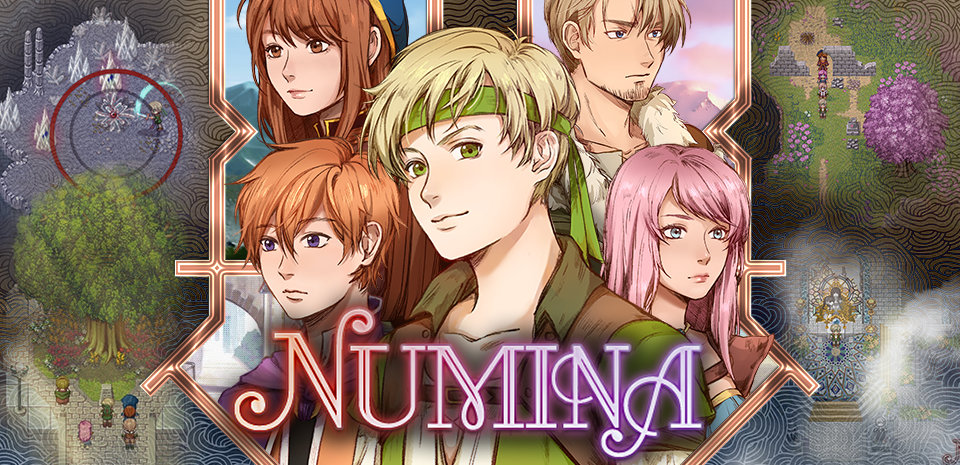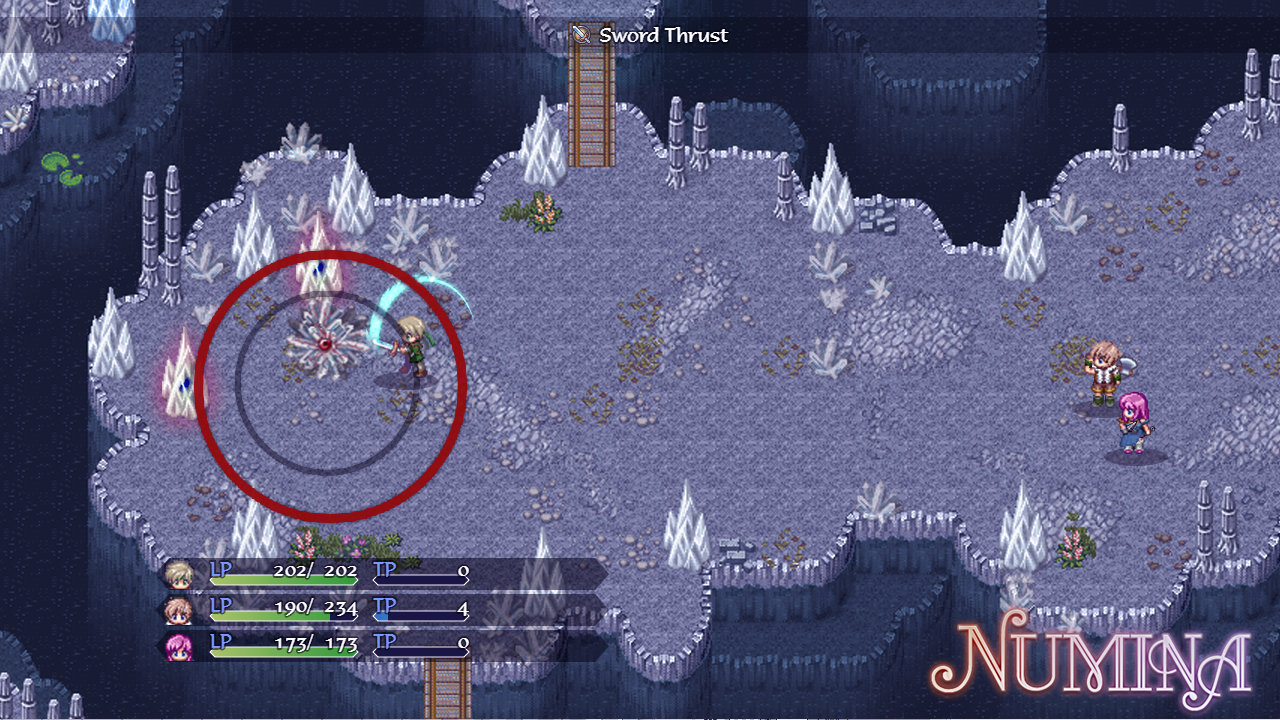A seemingly peaceful guard patrol comes to an explosive end as a ragtag group tries to make their way to safety. One by one, they’re recaptured for a supposed “higher purpose” as a dark, nightmarish scene quickly unfolds. This stark beginning quickly melts into a more peaceful one. Numina‘s protagonist, Shawn, blissfully unaware of the events that just transpired, prepares to visit a miraculous site known as the Temple of Clouds with his ailing little sister Aura and their neighbor friend Raphael. But things take a surprising and ultimately tragic turn for the group when Shawn gets separated and starts hearing the voice of a “guardian spirit” inside his head, someone completely foreign to the world as he knows it.
The main hook of Numina that sets it apart from other traditional RPGs is that, while the story is very much Shawn’s and his companions’, you, as the player, also take a central role in the narrative. In fact, the aforementioned “guardian spirit” that talks to Shawn and influences some of the party’s decisions happens to be you, the player. You’re not just another character avatar either, more like an omnipresent presence. The game even makes a point at a particular narrative juncture to reference that you’re well aware that you’re playing a video game. I’m used to fourth-wall-breaking stories falling more into the humorous vein or not taking themselves too seriously, but Numina treats your involvement in the plot as a major and essential point. You basically become the game’s sixth party member, and Shawn’s “guardian spirit” is brought up time and time again throughout the narrative in surprising and thought-provoking ways.

If that was all that was unique to Numina, one could almost take a brief glance at the game and assume it was just a typical fantasy RPG story with an interesting narrative gimmick. However, I’m happy to say that Numina is so much more than that, especially from a storytelling and character stance. The game hooks you from the beginning with its powerful and enigmatic opening. While elements of it start in typical JRPG fashion, the story takes on darker, more mature, and ultimately surprising directions at every turn. Some scenes are genuine punches to the gut, and every reveal further deepens the mystery and makes you want to play just a little more to figure out what happens next. Even random NPCs you meet help provide further details to flesh out what is really going on in brilliant ways. I won’t spoil the central mystery, but suffice it to say it is engrossing and makes you think.
The heart and soul of Numina is its main cast of characters: Shawn, Raphael, Sarah, Cassandra, Arc, and you-as-the-player. Our five heroes are a likable bunch with well-established personalities and their own arcs that play out alongside the main quest. I ended up eventually liking all of them the more I played, to the point where one of the final scenes in this first part of the game can be downright devastating to get through. Cassandra is quick-witted with some amazing one-liners; Arc is the kind-hearted healer of the group who is at first even conflicted on tagging along since he joins the party the latest; Sarah is a reserved and thoughtful amnesiac mage; and Raphael is the dependable older brother figure who looks out for everyone. Shawn has a surprising amount of depth and growth for the “hero” in this type of fantasy story, and player input helps cement “you” as a central figure within the group, too. Other characters aren’t quite as well-developed or explored with a few exceptions I’d be remiss to mention here on account of those pesky spoilers, but they fit their roles in the story well enough.
Those who have played traditional JRPGs know roughly how gameplay in Numina works. You guide Shawn and the others through the world map and dungeon areas, interacting with other characters or objects as you reach them. You even acquire a trusty grappling hook early on allowing you to scale heights and ledges when prompted. Not only do you have the main storyline to explore, but there are many optional sidequests, too. Puzzles are numerous and varied but never too frustrating. Enemies appear onscreen in dungeon areas, and coming into contact with them initiates a battle.

Fights are turn-based affairs, with each character in the party having a unique ability set. Different types of weapons have different button sequences that, if rightly initiated, can maximize damage. Some enemies have barriers you must first whittle down before bringing on the hurt. As character relationships grow, powerful combo moves between the party members open up, and characters can learn even more new skills or spells by acquiring ability scrolls either out on the field or in shops. Special skills require a certain percentage of TP to use, which you can gain more of through various actions during battle. While turn-based battle systems are often a bit more tiresome to me after a while, I was impressed by how consistently engaging Numina is with the different actions and button-pressing sequences.
Decisions you make throughout the game have repercussions too. There is a relationship meter that gauges your rapport with the other characters, including Shawn. You’re not going to be able to please everyone all the time, which can lower some characters’ approval of you and Shawn by extension. Increasing your friendship with the others not only gives them access to useful combat abilities but also lets you potentially view more story scenes involving those characters. If your rapport with a character is high enough, you can even help Shawn initiate a romance with someone later on (hint: don’t forget to pick up a cherry kiss at the first opportunity!). I was surprised by how well-written these romances are, and how LGBT-inclusive the story is as a whole in its cast and representation. Shawn and Arc ended up becoming a couple and shared a passionate moment together later on in my playthrough, and I thought it was rather touching how things played out between them. Other decisions, such as whether to take an item for later use, go to a rebel-staged event, or even try to speak up for a mother and young child have surprising repercussions throughout a playthrough. I’m eager to see how some unresolved decisions, like whether or not you finish off a boss character, might play out in the final portion of the story later on.
As far as graphics go, Numina is absolutely stunning in motion with colorful and detailed sprite-work. Areas are gorgeous to behold, and I love how camera angles and the like are used to great effect to further convey the emotions or impact of a given scene. All five party members have beautiful portraits that accompany their spoken lines as well, though if I had one wish it would be that some prominent NPCs, such as Hailey or Naomi, had the portraits as well. There is sometimes a bit of an issue with the game quickly jumping from transition scene to transition scene, but it is only noticeable at some points. The game crashed on me during the two Aziel boss fights, but only once each, and then I was able to play through both without trouble, so I don’t know if that is a more significant issue.

The English script work isn’t the best I’ve seen, with some odd phrasing and grammar issues. But I was far too engrossed in the actual narrative to pay this more than a fleeting thought before auto-correcting in my head. The plot is strong enough to make the occasional translation issue easy to overlook. Much of the soundtrack is composed by Thomas J. Peters, and it is absolutely phenomenal! Town and area BGMs such as “The Town of Caelum” and “Forest of Lost Memories” are gorgeous, with character themes such as “Sarah’s Theme” and “Arc’s Theme” being quite lovely and fitting. Battle songs such as “Rites of Warfare: IV. Ravage” or the Aziel boss battle theme “Aziel ~Numen of Destruction~” help to get the adrenaline rushing during fights. The soundtrack and stellar use of sound effects throughout the scope of Numina is impressive. Between the amazing soundtrack and the beautiful visuals, there is quite a lot of ear and eye candy to be had!
This is really only the first half of Numina, with the second part being planned as paid DLC with carryover save data to be released in the future. Some might balk at this, but I felt that this Part 1 was a self-contained story, and that ending alone makes me yearn for the final half of the game already! Again, it is a testament to how strong a title Numina is that I want there to be even more after fifteen hours of playtime already. I’m already looking forward to where my journey with Shawn and the others will take us next, and I can’t praise the game enough, given that. Numina is a surprising gem of an RPG, and I hope it shines bright enough for others to see.



